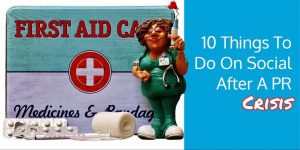
This is the fourth installment of the #SellMore Small Business Boot Camp series. In previous parts, we discussed how to find a product niche, how to source your products and how to evaluate your idea. This week, we’ll be covering how to identify any red tape that may hinder your ability to sell online, as well as recommendations for how you can continue to move forward.
After you’ve evaluated your online business idea and have an idea of how you will source your product, it’s wise to research the restrictions and regulations that may affect you when opening an ecommerce store. Understanding these issues before you try to start selling online will help you to plan wisely, likely saving you time, energy and money.
Watch this week’s sell more video to help you leapfrog the competition by truly understanding the obstacles that lie ahead for your product or service idea as well as your ecommerce business.
Many of these issues are just part of the cost of doing business online, but there are some hurdles that may come as a surprise. Either way, let’s get to thinking like a savvy business owner and cover all the bases to help you prepare.
Taxes
First, know that every state and country has a set of different expectations and standards when it comes to taxes. This means you have to conduct some research and understand your target market.
For instance, if your store’s demographic is located in the U.S., you’ll likely want to display your prices exclusive of tax. However, if your target demographic is Australian, for example, where shoppers are accustomed to seeing all-inclusive prices, you’ll want to display your prices with tax.
Some other issues to consider is what you are selling and where you are selling it from. For instance, if you are located in New York and want to sell clothing, know that clothing is taxed in New York state. In Britain, VAT tax applies to all non-essential goods. In California, items you sell in plastic bottles will carry a $ 0.11 recycling free, in addition to other taxes.
Talk to a tax professional or whatever local authority is available to you.
In all, talk to a tax professional or whatever local authority is available to you. They will be able to help you understand specific instances that may affect your product or business, give you great insights as to how you need to charge tax for your business’s location and help you apply for items like a Tax ID, which is needed to help you file taxes as well as let you know if you qualify for sales tax exemption and reseller certificates.
Keep in mind, too, that this information is constantly changing. As a matter of fact, there are some game changing tax rules for 2015 that may soon affect your business. Although the rulings are still out, it’s possible that digital goods and services may becomes taxable in 2015. This is just one of the many reasons why having a tax professional on hand or working with your local tax authority will be an important aspect of running a healthy business.
Payment Gateways
There are loads of payment gateways available for ecommerce stores these days. Don’t feel limited by the fact that many of them will have restrictions on specific products or services you may want to sell. All you need to know is that when you’re vetting payment gateways, be sure to ask if they have any limitations around the products or services you intend to sell in addition to whether or not they are hosted or non-hosted, have transaction fees, termination fees, anti-fraud features, monthly fees and setup fees.
Trademarks, Patents and Copyrights
First and foremost, there is a common misconception of what these words actually mean. The United States Patent and Trademark Office defines them as the following:
- Trademark: A word, phrase, symbol, and/or design that identifies and distinguishes the source of the goods of one party from those of others.
- Patent: A limited duration property right relating to an invention, granted by the United States Patent and Trademark Office in exchange for public disclosure of the invention.
- Copyright: Protects works of authorship, such as writings, music and works of art that have been tangibly expressed.
Depending upon the product you are planning to start selling online, you may or may not want to apply. Keep in mind, doing so is not necessary to start your business. However, you do need to be sure to check to make sure your product or service idea has not already been made official, as this can have major legal ramifications. For instance, if you want to go into business selling t-shirts with artwork you designed to resemble Star Wars characters –– you’re in trouble.
Simply make sure to research and find your area’s copyright, patent and trademark organization. They’ll be sure to help you get started on the right foot.
Shipping
USPS.com, as well as most shipment providers including FedEx and UPS, will typically explain their restricted items pretty clearly. First thing to note here is that you have options.
Do your research and figure out whether you can find a shipping provider that will take on your product. Typically there are shipping restrictions around items like aerosols, air bags, alcoholic beverages, ammunition, animals, cigarettes, dry ice, explosives, fresh fruits and vegetables, hazardous materials, nail polish, perfumes, perishable matter and poison. If you’re thinking of selling something, always check to see if you can find a shipping provider that will do it for a fair cost but will also actually ship the item.
There are shipping restrictions around items like aerosols, air bags, alcoholic beverages, ammunition, animals, cigarettes, dry ice and more.
Also note that a provider may allow for you to ship your item but will require paperwork and fees. You’ll want to take this into consideration sa you evaluate your provider.
For even more information on selling internationally check out the Federal Trade Commission’s Electronic Commerce: Selling Internationally A Guide for Businesses, as these guidelines will help to answer questions about taxes, duties and customs laws.
Inventory
If you will be holding substantial inventory, you will also want to check your lease, deed or zoning codes to see if there are any prohibitions on running a business like the one you’re contemplating out of your home. Certain locations have restrictions.
Age Restrictions
Anytime you launch a website, ecommerce or not, it’s essential you be aware of the Children’s Online Privacy Protection Act (COPPA). This act details quite a few regulations, but the one that will likely apply most often to your site is the inability to collect any personal information from a child under the age of 13.
COPPA passed into law in 2000 when Congress wanted “to increase parental involvement in children’s online activities, ensure children’s safety during their participation in online activities, and most importantly, protect children’s personal information.” So, if you’re planning on selling a product or service that tailors specifically to a young audience, you’ll need to most certainly abide by COPPA regulations.
If you’re planning on selling a product or service that tailors specifically to a young audience, you’ll need to most certainly abide by COPPA regulations.
As far as age verification for ecommerce store owners selling items that have age restrictions, it is highly suggested you look into your country’s specific codes. In the U.S., there do not appear to be any formal requirements for tobacco or alcoholic products, at least after looking into what the USA Food and Drug Administration and Federal Trade Commision have to say about it. However, there are lengthy arguments being made all over the web trying to require websites to develop a formal age verification process.
The Center for Tobacco Control Research & Education is case in point with their article on how the FDA Should Restrict Internet Sales. However, in taking a look at specific organizations like the Advertising Standards Authority and The Brewers Association Marketing and Advertising Code it is highly suggested that all websites selling items with age restrictions should make every effort to identify their audience by gating their site and requesting age and date of birth.
Long story short, every country is different as far as their demands on how to run a business, and things get tricky when it comes to age restrictions for products. Do your research and stay on top of legislation to ensure your business is on the up-and-up.
Business Insurance
There are multiple types of insurance for small businesses, as defined by the U.S. Small Business Administration including general liability, product liability, professional liability, commercial liability and home-based insurance. Depending upon your business as well as where you are located be sure to reach out to you local provider to find out which type would be wise for your specific business needs.
During your product or service vetting process, it’s recommended to at least take a look at product liability insurance.
During your product or service vetting process, it’s recommended to at least take a look at product liability insurance. This type of insurance is intended for companies that manufacture, wholesale, distribute and retail a product and may be liable for its safety. Also take a look at professional liability insurance (also known as errors and omissions insurance). This type of liability coverage protects your business against malpractice, error and negligence in provision of services to your customers.
Licenses and Permits
Not only do you want to figure out how you want to source your product or service, but depending on your product you may also need a license to sell it. This may vary depending on the country in which you are located so contact your council licensing department. A great and fairly well rounded resource we love is Legal Zoom. They will not only help you out with business licenses. but they can get you running the right direction with the other red tape items mentioned above.
Generally, the sale of digital information, clothing or handcrafted items (made in the USA) doesn’t require a special business license.
“If you’re selling special products to a regulated industry (e.g., medical devices or holistic health care supplements), you’ll need to check with your state to see if you need to be licensed to provide those kinds of products or service,” wrote Nina Kauman for Entrepreneur. “But generally, the sale of digital information, clothing or handcrafted items (made in the USA) doesn’t require a special business license. Rather, the business licensing required for an online retail business is not substantially different than that of a storefront business.”
PCI Compliance
PCI Compliance is a standard these days and nearly all ecommerce providers have a decent amount of PCI compliance baked into their platform. Small merchants tend to become prime targets, according to the PCI Security Standards Council, which is why ecommerce platforms take this aspect of running an online business so seriously. However, do make sure to educate yourself. Being PCI compliant means you will not only provide a secure, encrypted checkout experience, but you’ll also need avoid storing any purchasing information on paper or via recording (i.e. if someone were to give you their card number over the phone).
Kooky Things
In all of the research completed, we also found some random, individual platform requirements. For instance, the iTunes terms of service contains a “you are forbidden from using this software to make WMDs” clause. Be sure to read up on the terms of service agreements on all platform you choose to use.
Tune in next week as we continue to dive into specific areas that tend to get folks hung up when starting an online store.
(348)








